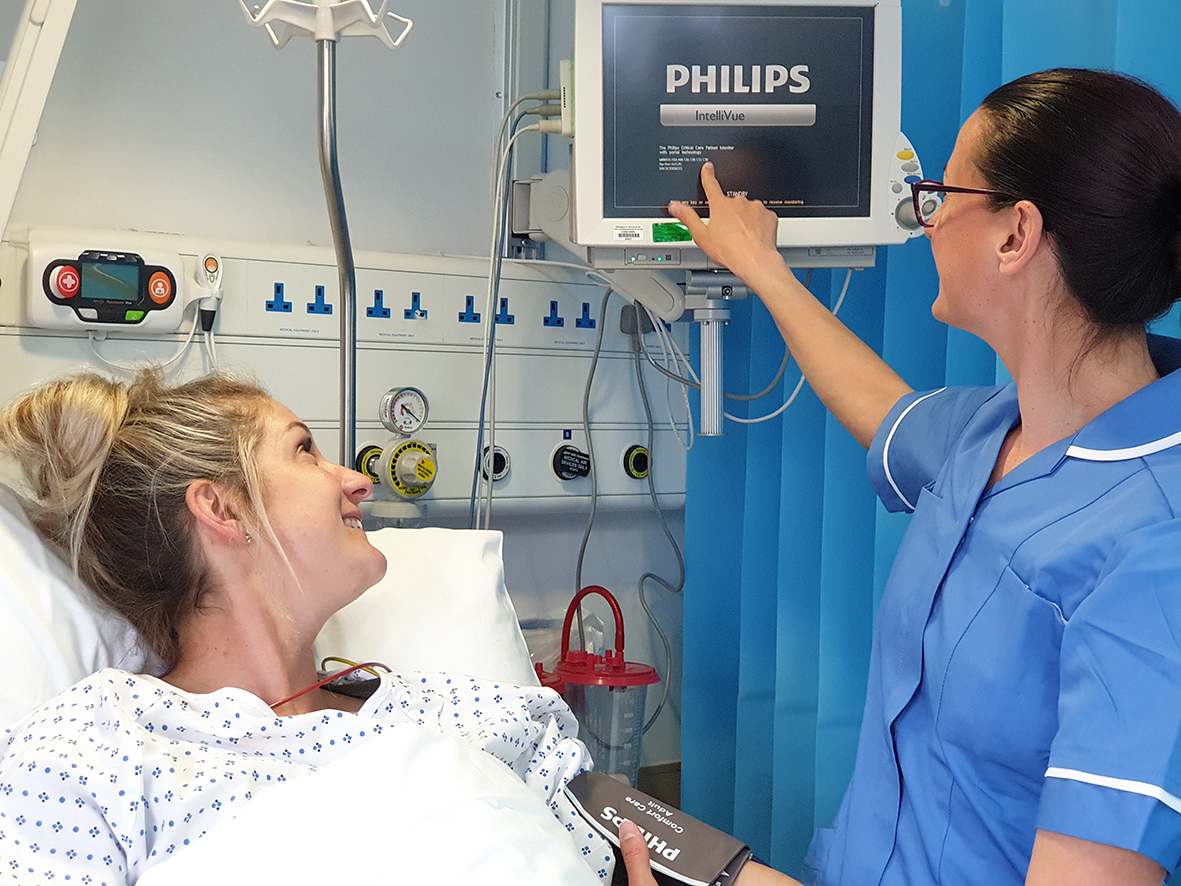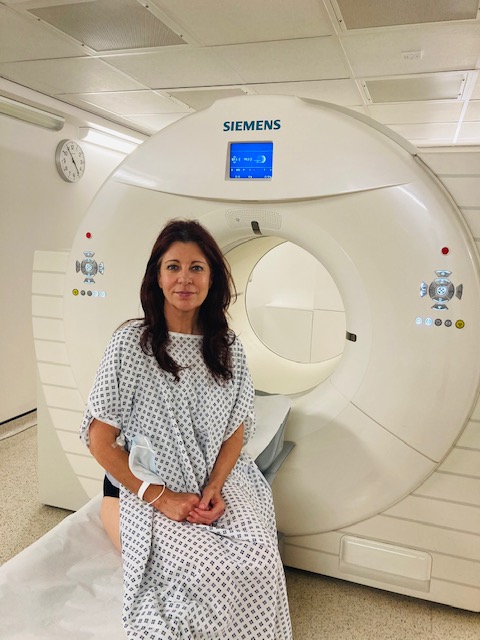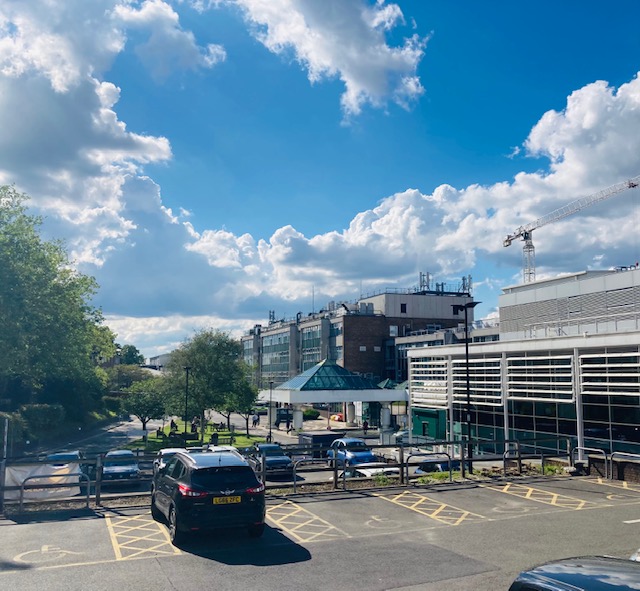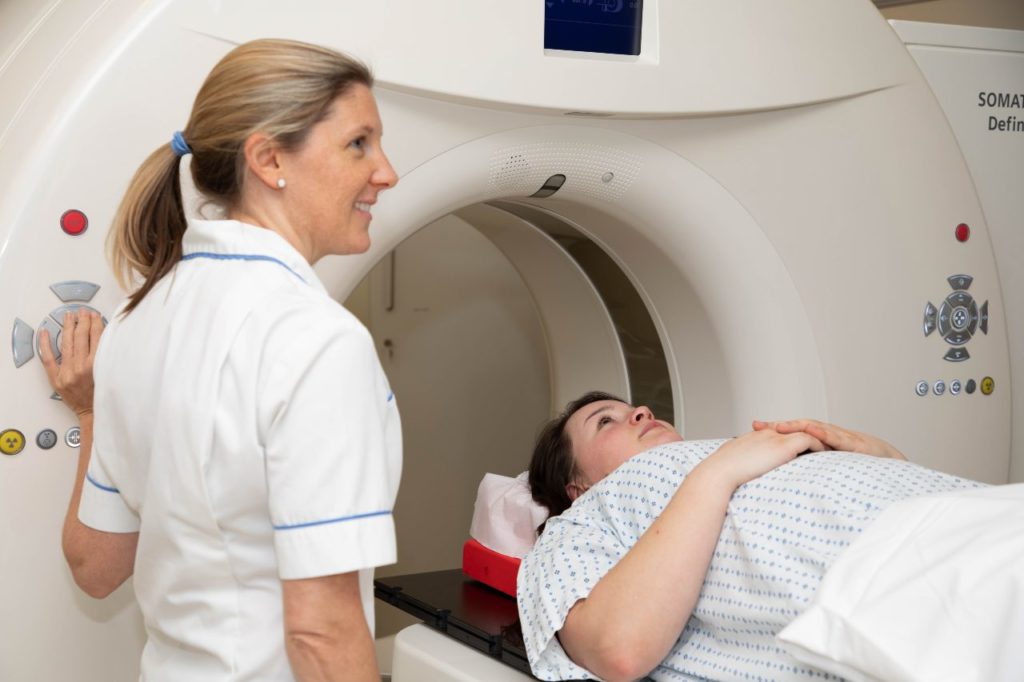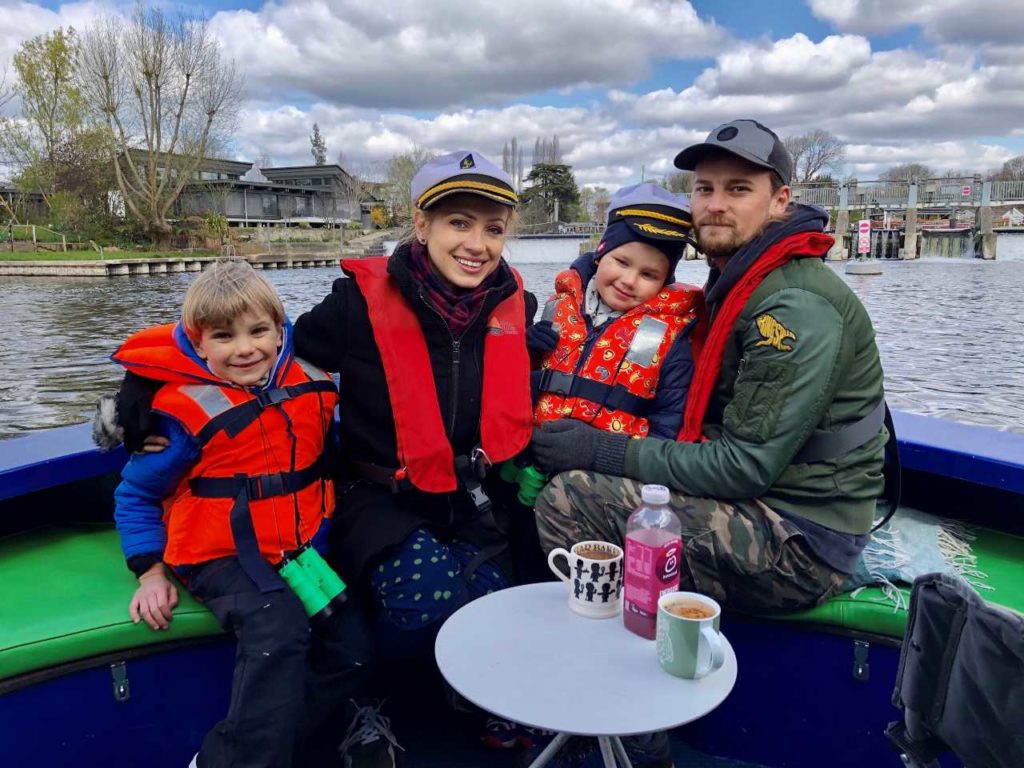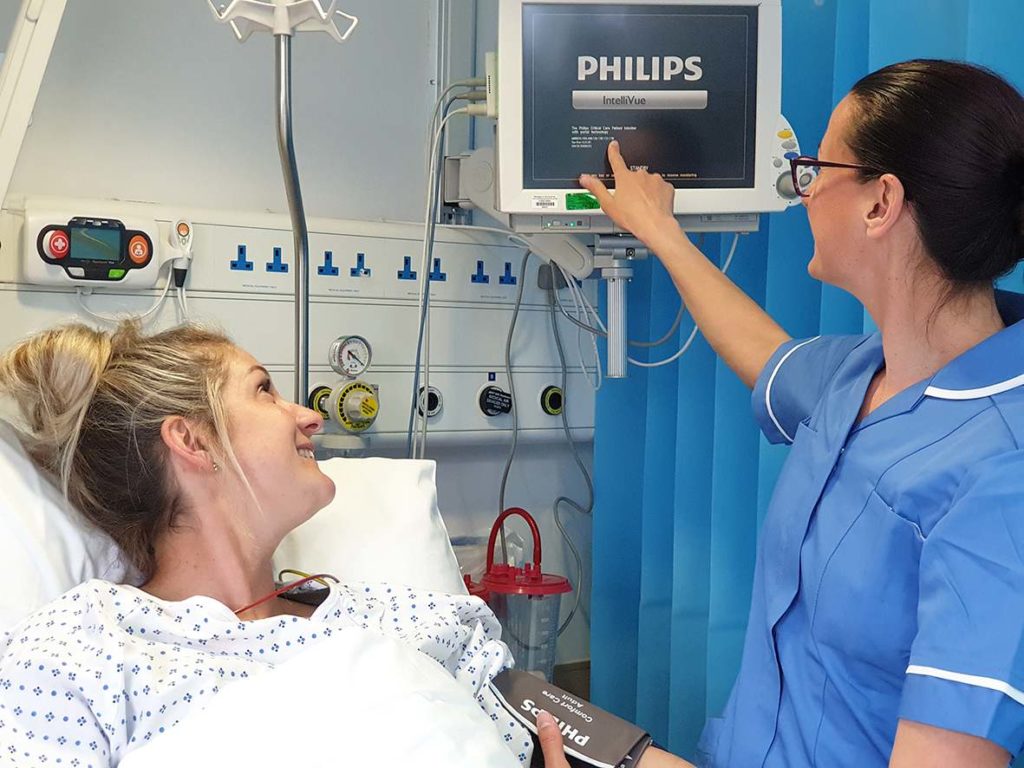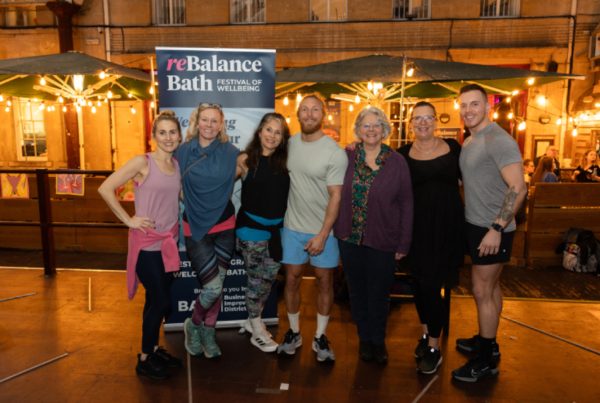Darling Editor Karine Torr: What can I say? Work, COVID, lockdown, the dreaded Brexit, all things occupying my mind over the past two years, annoying me, annoying my family and friends, ever present, all consuming. An exciting time at Darling with our online magazine blossoming and growing. Our Darling shop site was coming on nicely and our summer print issue about to launch – everything went into slo-mo as Boris rubbed his hands and flung open the doors of restaurants and fitness clubs in May this year. That day Gordon and I sat opposite our lovely GP and heard the news. My cancer journey had begun.
Neuroendocrine was the diagnosis, a rare form of cancer, luckily slow growing but pretty lethal and ‘manageable’ (hopefully) with a hormone injection every 28 days. I’ve only had three but will soon find out if it’s working to, at most, halt the growth and if I’m lucky, shrink a bit. Fingers crossed.
Thankfully the Royal Marsden have been brilliant and lifesaving. I’m also doing lots of complimentary things with acupuncture, supplements and an amazing PEMF mat – all of which keep me disciplined and busy every day and feeling relatively well. But that’s what you’ve got to do when your life is thrown into chaos.
Here are some helpful resources for coping with this ever-increasing, universal health problem and celebrating Breast Cancer Awareness Month in October.
Cancer Research UK
We spoke to Lynn Daly, spokesperson for Cancer Research UK in London
It’s an alarming statistic, but 1 in 2 of us will get cancer in our lifetime.
That’s why Cancer Research UK exists.
We’ve been working to beat cancer for 100 years and although we have made huge progress, there’s no ‘one cure’ for the disease. There are more than 200 types of cancer, each requiring different treatments. Every day, 93 people in London are diagnosed with cancer. Our pioneering work into the prevention, diagnosis and treatment of cancer has helped save millions of lives. Over the past 40 years survival has doubled. In the 1970s just 1 in 4 people survived their disease for 10 years or more. Today 2 in 4 survive.
Our ambition is to accelerate progress and see 3 in 4 patients surviving the disease by 2034.
Over the last few decades, thanks to funding from our supporters, Cancer Research UK has saved lives by:
• Helping to double breast cancer survival
• Being a key player in the development of radiotherapy, which now benefits more than 130,000 patients every year in the UK
• Some help to prove the value of cervical screening, which prevents thousands of deaths every year, Cancer Research UK supports research into all aspects of cancer through the work of over 4,000 scientists, doctors and nurses.
Our Vision
Our vision is to bring forward the day when all cancers are cured.
There are many ways to support Cancer Research UK’s work:
• Taking part in one of the many Race for Life events in London this Autumn.
• Challenge yourself to do the Shine Night Walk.
• Join a 24-hour Relay for Life event
• Volunteer in our shops.
• Do your own fundraising
• Share your personal story as a media volunteer
We aim to make sure that at least 80p in each pound we receive from donations is available to help beat cancer. Last year the charity spent £153m in London alone.
Following one of the most difficult years in the charity’s history, there is cautious optimism. Progress has included:
• Launching Cancer Grand Challenges, a major new partnership with the US National Cancer Institute requiring researchers worldwide to take on the toughest questions.
• TRACERx, the charity’s biggest ever study of lung cancer, produced a number of exciting results, including how to harness the immune system to boost treatment.
• Cytosponge, the ‘sponge on a string’ test for Barrett’s oesophagus, a condition that increases the risk of oesophageal cancer. During the pandemic, it was used by some GPs to identify people who needed further testing.
• Working in partnership with the Obesity Health Alliance to influence the UK Government strategy for obesity. This resulted in a commitment to restrict junk food marketing and price promotions.
• Funding three new research teams working on cancer in children and young people including research on protecting children’s brains during radiotherapy and developing a new immunotherapy to treat leukaemia.
Visit www.cancerresearchuk.org or follow us on Twitter and Facebook
One Stop Breast Clinic at Parkside Hospital
At Cancer Centre London, we work closely with our neighbouring Parkside Private Hospital and offer a One Stop Breast Clinic. The Care Quality Commission has recognised this clinic as ‘an area of outstanding practice’.
What is the One Stop Breast Clinic?
The One Stop Breast Clinic is an outpatient clinic at Parkside Private Hospital if you are concerned about any breast symptom, such as:
- a lump or thickening in your breast or armpit
- a change in the size, shape or feel of one or both breasts
- a change in the position of the nipple, such as turning inwards
- fluid leaking from the nipple
- skin changes in your breast
What happens at the One Stop Breast Clinic?
Our experts carry out a detailed assessment made up of three stages:
- Initial assessment: A specialist breast consultant finds out your full medical history and examines you.
- Imaging tests: You may have a breast ultrasound scan and, if needed, a mammogram (an X-ray of the breast).
- Further assessment: If we find any abnormal areas in your breast, a radiologist can carry out more painless tests. We may take a small sample of breast cells or tissue for testing.
Same day results to give you peace of mind.
With our one-stop approach, we can diagnose breast symptoms quickly and accurately. You get your imaging results on the same day and other test results within two to three working days.
Most people are reassured that their symptoms are non-cancerous and leave our clinic with peace of mind. If we find any abnormality, our multidisciplinary team give you and your loved one’s immediate support. Specialist consultants explain the treatment options and develop a personalised treatment plan.
Booking
The One Stop Breast Clinic is open six days a week and there are minimal waiting times. For more information, please visit www.parkside-hospital.co.uk and www.cancercentrelondon.co.uk
Prostate Cancer
Q&A: What do you need to know about prostate cancer?
Prostate Cancer UK Specialist Nurse Sophie Smith provides confidential support and information about prostate cancer to men and their loved ones. Although the disease only affects men, nearly one in five calls she receives are from women concerned about the men in their lives.
What is prostate cancer?
Prostate cancer is the most common cancer in men, affecting 1 in 8 men in their lifetime.
If prostate cancer is caught early, there’s a good chance it can be cured. Unfortunately, too many men are still being diagnosed after their cancer has spread, when treatment, rather than cure, is the only option.
Who’s at risk?
Men over 50, black men, and men with a family history of prostate cancer are all at higher risk of the disease, and should speak to their GP.
Men can check their risk online in 30 seconds at prostatecanceruk.org/riskcheck
What symptoms should men look out for?
Most men with early prostate cancer don’t have any symptoms – that’s why it’s so important that they know about their risk. But, as a rule, if they notice changes in the way they urinate, it’s a good idea to get checked out.
I’m concerned that a loved one is at risk of prostate cancer – what should I do next?
If your loved one is at higher risk of prostate cancer, I’d encourage them to speak to their GP about the pros and cons of a PSA test. This includes men over 50, and black men and men with a family history over the age of 45.
If you have any concerns or questions, Sophie and the rest of Prostate Cancer UK’s Specialist Nurses are here to help. Call them on 0800 074 8383 or visit prostatecanceruk.org/nurses
Maggie’s Centres
Maggie’s has been life-changing for thousands of people who walk through the doors of our centres every day, in desperate need of cancer support. But our work is not done. Every two minutes someone in the UK is diagnosed with cancer. And with an estimated 2.5 million people living with cancer already, our support has never been more vital to ensure that people can live their life to the full – no matter what their situation.
Maggie’s has 24 centres across the UK and three abroad, with one of the most recent opening in in the grounds of The Royal Marsden hospital in Surrey. Our aim is to have a Maggie’s in the grounds of every major UK NHS cancer centre and there are 60 in total. Currently, almost half have no dedicated cancer support provision and we seek to fill the gaps where populations are underserved.
Maggie’s centres complement NHS medical care by providing the non-clinical support, without which, can leave people feeling lost, confused and desperate. Maggie’s offers free, personalised, support to help people see beyond their diagnosis, feel less overwhelmed, manage their stress, get the best out of their treatment and deal with the consequences of cancer. Exhausting treatment and difficult emotions not only affect the person with cancer but also their loved ones, so we offer tailored support to family and friends.
For more information on Maggie’s visit: Maggies.org
Momentum Children’s Charity
Being told your child has cancer or another life-challenging condition is completely devastating, and day-to-day life is turned upside down. Momentum Children’s Charity is here to make sure no family has to cope with this news alone. Momentum supports families across Southwest London, Surrey and West Sussex working in partnership with Kingston Hospital, Epsom Hospital, St Peter’s Hospital in Chertsey, East Surrey Hospital, St George’s Hospital in Tooting and Royal Surrey County Hospital. These hospitals refer families to the charity following a child’s diagnosis. Through their Family Support Workers, they work closely with each family to understand their needs. They offer uniquely tailored support.
The support Momentum offers ranges from counselling to play, art and music therapy and help children to express their feelings about their illness – both at home and on the hospital ward. Every family is given a Family Support Worker who’ll stand should-to-shoulder with them. Often help is offered to every member, from the diagnosed child, to parents, grandparents and siblings. Family Support Workers might sit and listen to the fears and worries of a parent, connect family members with peer support groups or even to help arrange educational support.
At any one time Momentum supports over 250 families whose child is in active treatment and a further 100 bereaved families, and they are there whatever the outcome, for as long as they are needed.
Visit www.momentumcharity.org or follow them on Facebook, Instagram or Twitter.
Macmillan Cancer Support
Cancer can also have a huge impact on your finances, as well as your health. In South London, Macmillan Cancer Support funds two teams of specialist welfare benefits advisors that can offer expert financial and debt guidance to people living with cancer, including family and carers. The Macmillan Welfare Benefits Advice Service is run in partnership with Citizens Advice Wandsworth.
One in two people with cancer in London (53%) are severely financially impacted as recent research from Macmillan Cancer Support, revealing the devastating impact of a cancer diagnosis Resources such as the Macmillan Welfare Benefits Advice Service are proving more essential than ever, as some patients find themselves struggling financially while also dealing with the physical and emotional impact of the disease.
Rodrigo Fenick Figueroa, Macmillan Benefits CaseWorker at Citizens Advice Wandsworth explained how his team helps South Londoners living with cancer:
“Cancer patients are entitled to this welfare support, but they often tell us that the application process can feel like having to jump one hurdle after another. That it’s as if they’re fighting a losing battle, which can cause a good deal of unnecessary additional stress. We’re here to help people navigate that process!”
If you are affected by cancer, live in Southwest London and need financial advice, please contact the Macmillan Citizens Advice Wandsworth Service on 020 7042 0332 or visit their website at cawandsworth.org/macmillan or email macmillan@citizensadvicesouthwark.org.uk www.macmillan.org.uk
You may also like reading more about Editor Karine’s cancer journey

